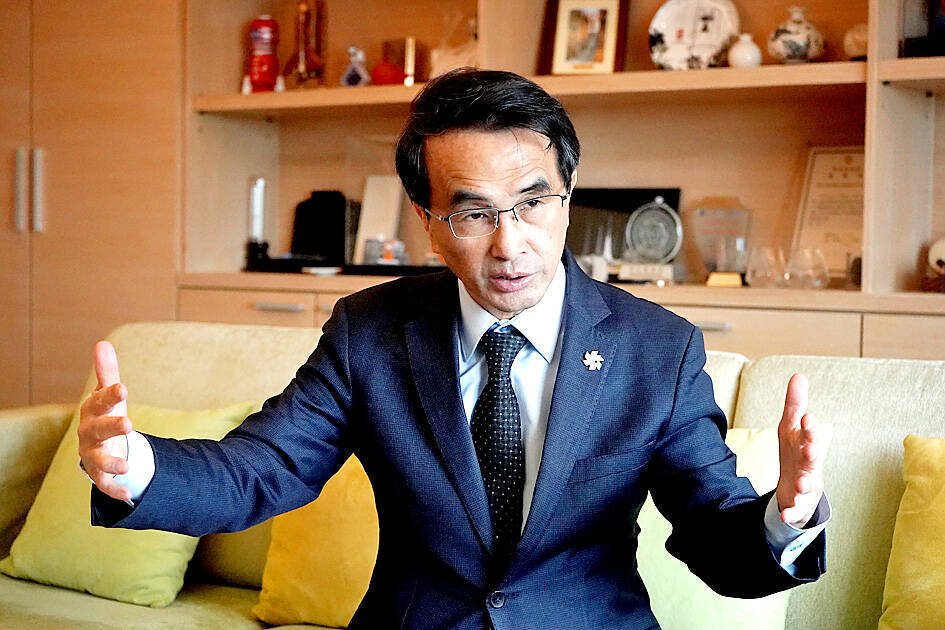The Taiwan Space Agency (TASA) yesterday said it plans to launch six low Earth orbit satellites starting in 2026 as part of the government’s plan to boost the resilience of the nation’s communications.
The development of the technology gained attention after Ukrainians were able to access the Internet through Space Exploration Technologies Corp (SpaceX) CEO Elon Musk’s Starlink satellite service, despite their infrastructure being severely damaged in the war with Russia.
Two of the satellites would be built by the government, while four would involve cooperation between TASA and private contractors.

Photo courtesy of the Industrial Technology Research Institute
“Over the past 30 years, the satellite technology in Taiwan has mostly been used for remote sensing and meteorological observations,” National Science and Technology Council Minister Wu Tsung-tsong (吳政忠) said.
“The research and development of communications satellite technology is indeed challenging, as it is complicated and fast-changing. As such, the government needs to take the lead, which is why it has extended the Phase III space project to 2031 and added NT$40 billion [US$1.23 billion] to the budget,” he said.
TASA Director-General Wu Jong-shinn (吳宗信) said the agency plans to launch the first low Earth orbit satellite in 2026 using a SpaceX rocket and the second one in 2028.

Photo: CNA
The first satellite’s body would be made in Taiwan, but the Ka bend communication payload would be built in partnership with an overseas contractor, he said.
The second satellite would be jointly developed by the Industrial Technology Research Institute, which is capable of developing 4G and 5G systems, and TASA, Wu Jong-shinn said.
The total budget to launched the two rockets is NT$900 million, he said, adding that the agency hopes that the contracts for the four other satellites will be placed on auction this year.
Aside from Starlink, there are other low Earth orbit satellite service providers, many of whom are eager to set up ground stations in Taiwan.
“However, we have to try to develop the technology ourselves. That way, we would not be worried if some companies refuse to transfer it to us,” Wu Jong-shinn said.
The launch of the six low Earth orbit satellites, known as project “Beyond 5G (B5G),” would only be the beginning, Wu Tsung-tsong said.
Simulations have shown that if there are two low-orbit communication satellites, they would only hover over Taiwan for three to five minutes when orbiting the Earth, he said.
“To achieve uninterrupted communication 24 hours a day, it is obvious that six satellites would not be enough. Taiwan needs at least 120 satellites to build communications resilience,” he said.
The next step is to build up the satellite communications industry, which not only includes existing electronics industry operators, but also new entrepreneurs, Wu Tsung-tsong said.
“They will see that telecommunications business opportunities in the next 10 or 20 years will be in space,” he said.
“Taiwan’s space ground equipment industry is already of considerable scale, with an output value exceeding NT$200 billion, but there is still a lot of room for growth in satellite manufacturing, rocket launch services and other fields,” he said. “Like a baseball player who can pitch and hit, Taiwan must be skilled on the ground and in space.”

The CIA has a message for Chinese government officials worried about their place in Chinese President Xi Jinping’s (習近平) government: Come work with us. The agency released two Mandarin-language videos on social media on Thursday inviting disgruntled officials to contact the CIA. The recruitment videos posted on YouTube and X racked up more than 5 million views combined in their first day. The outreach comes as CIA Director John Ratcliffe has vowed to boost the agency’s use of intelligence from human sources and its focus on China, which has recently targeted US officials with its own espionage operations. The videos are “aimed at

STEADFAST FRIEND: The bills encourage increased Taiwan-US engagement and address China’s distortion of UN Resolution 2758 to isolate Taiwan internationally The Presidential Office yesterday thanked the US House of Representatives for unanimously passing two Taiwan-related bills highlighting its solid support for Taiwan’s democracy and global participation, and for deepening bilateral relations. One of the bills, the Taiwan Assurance Implementation Act, requires the US Department of State to periodically review its guidelines for engagement with Taiwan, and report to the US Congress on the guidelines and plans to lift self-imposed limitations on US-Taiwan engagement. The other bill is the Taiwan International Solidarity Act, which clarifies that UN Resolution 2758 does not address the issue of the representation of Taiwan or its people in

US Indo-Pacific Commander Admiral Samuel Paparo on Friday expressed concern over the rate at which China is diversifying its military exercises, the Financial Times (FT) reported on Saturday. “The rates of change on the depth and breadth of their exercises is the one non-linear effect that I’ve seen in the last year that wakes me up at night or keeps me up at night,” Paparo was quoted by FT as saying while attending the annual Sedona Forum at the McCain Institute in Arizona. Paparo also expressed concern over the speed with which China was expanding its military. While the US

SHIFT: Taiwan’s better-than-expected first-quarter GDP and signs of weakness in the US have driven global capital back to emerging markets, the central bank head said The central bank yesterday blamed market speculation for the steep rise in the local currency, and urged exporters and financial institutions to stay calm and stop panic sell-offs to avoid hurting their own profitability. The nation’s top monetary policymaker said that it would step in, if necessary, to maintain order and stability in the foreign exchange market. The remarks came as the NT dollar yesterday closed up NT$0.919 to NT$30.145 against the US dollar in Taipei trading, after rising as high as NT$29.59 in intraday trading. The local currency has surged 5.85 percent against the greenback over the past two sessions, central